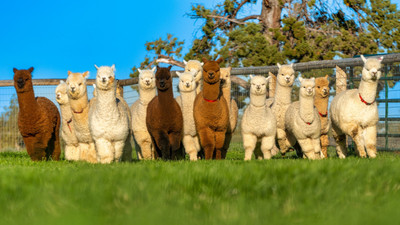Harnessing the Power of Alpaca Poop: Nature's Golden Fertilizer
Alpaca by Design on Jul 28th 2023
When it comes to fertilizing your garden, the first thing that may come to mind is synthetic chemicals or animal manure from common livestock like cows or chickens. However, there's a lesser-known but highly effective alternative that nature has gifted us – alpaca poop. Surprising as it may sound, alpaca poop is a treasure trove of nutrients that can work wonders for your plants and soil. In this blog post, we will explore why alpaca poop is an excellent choice for organic fertilizer and how it can help you achieve a thriving, sustainable garden.
Rich in Essential Nutrients
One of the primary reasons why alpaca poop is highly regarded as an exceptional fertilizer is its nutrient content. Alpacas have a unique digestive system that allows them to break down their food efficiently. As a result, their droppings are rich in essential nutrients such as nitrogen, phosphorus, and potassium, commonly known as N-P-K, which are crucial for plant growth.
Unlike synthetic fertilizers, which can lead to an imbalance of nutrients and harm the environment, alpaca poop provides a well-rounded and natural nutrient profile that nourishes plants without causing excessive nutrient leaching or runoff.
Non-Burning and Low Odor
Alpaca poop has a distinct advantage over some other animal manures – it is non-burning. Traditional manures from animals like chickens and cows can be too high in nitrogen, which, when applied fresh, might "burn" plants due to its high ammonia content. On the contrary, alpaca poop is gentler on plants, ensuring a steady release of nutrients without causing harm.
Additionally, one of the benefits that gardeners appreciate is that alpaca poop has a relatively low odor compared to other manures. This makes it a practical choice, especially for those living in urban areas or neighborhoods where strong smells could be an issue.
Balancing Soil pH
The pH level of your soil plays a vital role in plant health and nutrient uptake. Alpaca poop, when composted and incorporated into the soil, helps to stabilize and balance the soil pH. It acts as a natural buffer, preventing drastic fluctuations in pH levels and maintaining a more neutral, fertile environment for plants to thrive.
Enhancing Soil Structure
In addition to its nutrient-rich properties, alpaca poop also improves the soil structure. When mixed with the soil, it increases its water-holding capacity, ensuring that your plants receive a steady supply of moisture. Furthermore, the organic matter in alpaca poop enhances soil aeration, allowing plant roots to access oxygen easily.
Eco-Friendly and Sustainable
Using alpaca poop as fertilizer aligns perfectly with eco-friendly and sustainable gardening practices. Alpacas have a significantly lower environmental impact compared to other livestock, as they produce relatively less waste and require less land and resources. Moreover, their gentle grazing habits help preserve pastures and prevent soil erosion.
By choosing alpaca poop as your fertilizer, you contribute to reducing the environmental strain caused by conventional farming practices that rely heavily on synthetic chemicals and large-scale animal farming.
In conclusion, alpaca poop is indeed a hidden gem in the world of organic gardening. Its nutrient-rich composition, non-burning characteristics, and low odor make it a highly desirable option for fertilizing your garden. Additionally, it aids in balancing soil pH, enhancing soil structure, and promotes sustainable and eco-friendly practices.
If you're fortunate enough to have access to alpaca poop, consider composting it before applying it to your garden. Composting not only maximizes its benefits but also reduces any potential pathogens that might be present in raw manure.
So, the next time you're looking to give your plants a boost, turn to the magical power of alpaca poop – nature's golden fertilizer. Your garden will thank you, and you'll be rewarded with bountiful and healthy harvests while taking a step towards a more sustainable future. Happy gardening!

